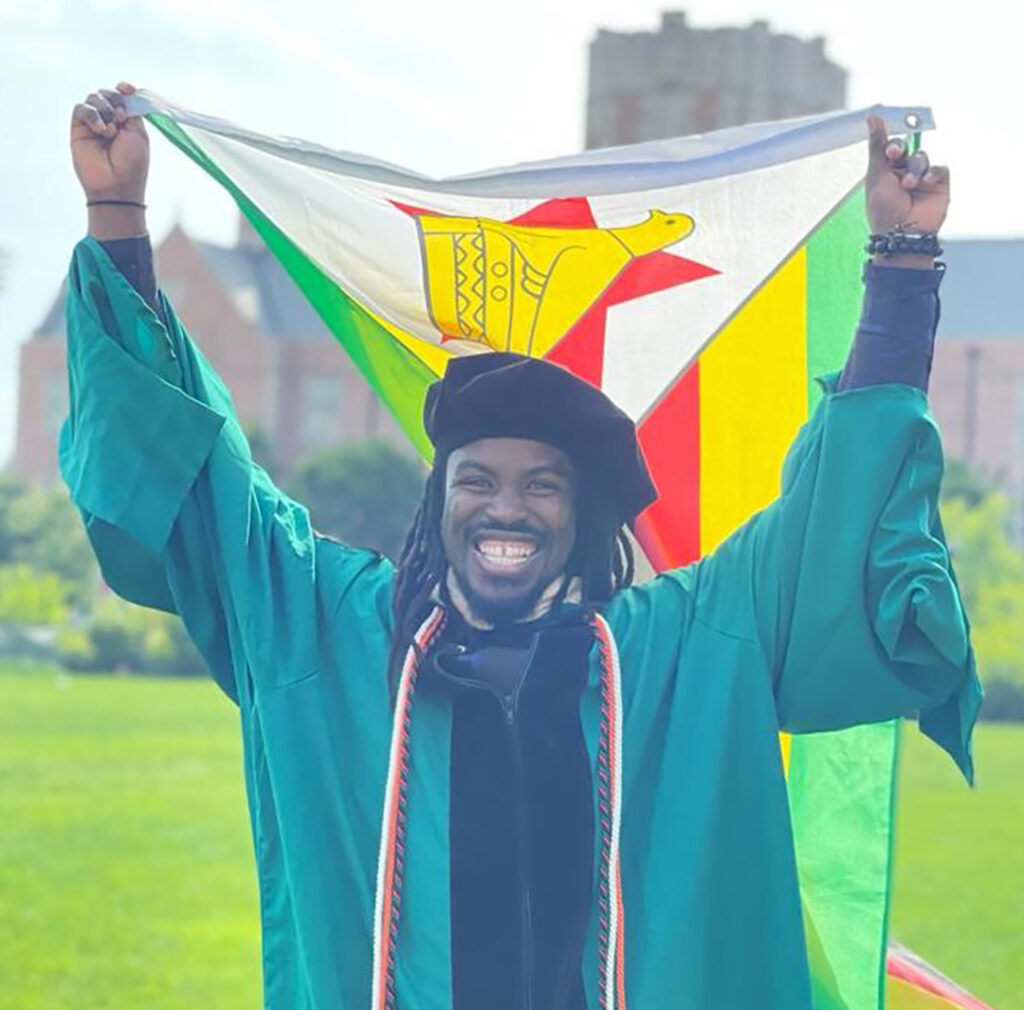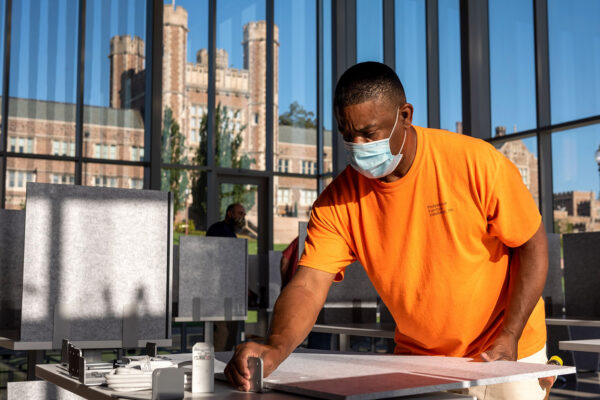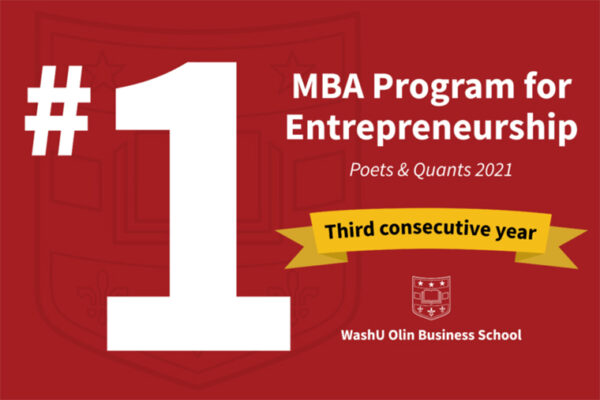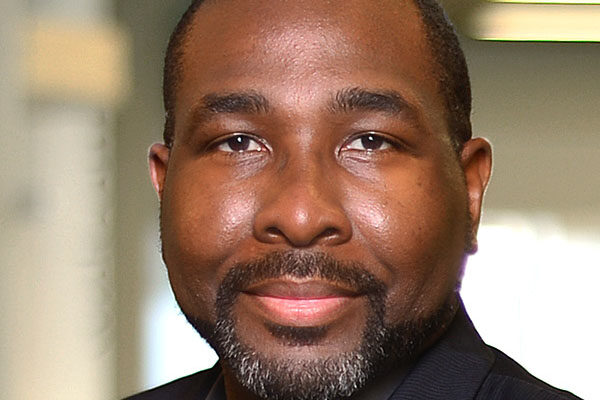A few years ago, when Lori Coulter and her mother were discussing a Florida beach trip, her mother commented that whoever could make a swimsuit that fits would have a goldmine.
And the idea for Summersalt was born. Tired of suits that women couldn’t actually move in comfortably and that were marketed in an oversexualized way, Coulter and her co-founder created a brand they hoped would inspire the joy women used to feel as kids playing on the beach.

It’s what entrepreneurs who graduate from Washington University do: take a problem, find a solution and make the world a better place. Coulter, MBA ’99, is not alone. For Byron Porter, MBA ’20, a fatal accident in the rail yard of his former company led him to create technology that would keep workers safe. When Lungile Tshuma, MBA ’21, had trouble finding a college in the United States, he created a platform to help universities connect with international students. Megan Berry, MBA ’15, figured out a way for small brands to afford the price tag on a physical store. And Mark Schwager, MBA ’11, noticing there was no electrification in the agriculture industry, is in the process of integrating smart technologies into farm operations.
Some of these concepts were conceived at WashU and developed within the university’s entrepreneurship program at Olin Business School. The entrepreneurship program was created in the early 2000s, following a national trend for schools to begin focusing their research not just on large, established corporations, but on getting companies off the ground.
Today, Olin offers both undergraduate and graduate degrees in entrepreneurship. In 2021, the MBA Program for Entrepreneurship earned its third consecutive No. 1 ranking by Poets & Quants, an online business school news journal. The ranking is based on an analysis of 16 components of a school’s entrepreneurship program, including the number of startups launched and courses in entrepreneurship offered. (WashU placed first for having the highest percentage of MBAs launching companies and the highest percentage of MBAs involved in a startup over the past year.)
Yet Olin Business School Dean Mark Taylor is quick to point out that entrepreneurship ideology is embedded throughout the entire business school, not just in these dedicated programs. There are more than 90 courses available to MBA students at Olin, and Taylor says 90% of those include entrepreneurship-related content. Spreading entrepreneurship education throughout Olin’s curriculum was an important mission for Taylor when he took over the dean position in 2016. It was then he created a strategic plan for Olin, centered on four pillars of excellence, one of which was a focus on entrepreneurship and innovation.
“Entrepreneurship is very much part of our DNA. It’s infused in what we do.”
— Mark Taylor, dean, Olin business school
The atmosphere at the business school, combined with hands-on learning opportunities, a dedicated center for entrepreneurship at the university and a region loaded with resources for startups, creates in its students a love of problem solving to better the world.
Course load
One of the things Dan Conner, MSChE ’10, MBA ’12, now a venture capitalist in St. Louis, enjoyed most about his graduate school experience was the opportunity to take courses cross-listed across departments. For Mark Schwager, the founder of Monarch Tractor, it was the MBA program’s small class size.
According to Doug Villhard, EMBA ’13, who serves as the academic director for entrepreneurship, these two things are exactly what makes WashU’s entrepreneurship program special. The small class sizes make it easy for students to collaborate. And because classes are open to both undergraduate and graduate students across WashU’s schools, the benefits of those collaborations are multiplied.
“Our students in the MBA program interact with law students, engineering students, social work students and medical students. We’re leveraging and integrating with the entirety of Washington University, and that’s very powerful.”
— Doug Villhard, EMBA ’13, academic director for entrepreneurship
Dave Kanoff earned an undergraduate degree in business from WashU in 2012, then immersed himself in the entrepreneurship world, working at an early-stage startup and as a problem solver for an investment group in Asia. When he decided he wanted to earn an MBA in entrepreneurship, the school’s focus on experiential learning was a key factor in bringing him back to the university. Olin’s top ranking and global mindset also influenced his decision. Throughout the program, students participate in a variety of hands-on learning opportunities, like taking on consulting projects with early-stage startups through the CEL Entrepreneurial Consulting Team; creating business plans in their courses; participating in competitions through the Skandalaris Center for Interdisciplinary Innovation and Entrepreneurship; and networking with entrepreneurs and investors. Kanoff experienced all of this, as well as his choice of extracurricular activities, including Olin’s annual Impact Investing Symposium and the student-led Entrepreneurship & Venture Capital Association.
The MBA curriculum also provides the opportunity and resources for students to work on a business concept from its inception all the way through to its launch. Megan Berry first worked on her business idea in Olin’s “Introduction to Entrepreneurship” course. She’d been studying architecture at WashU but had become more interested in the business side of the field when she realized how long it would take her to actually create an architecture project.
“Most projects take five to seven years from start to finish,” Berry says. “That meant that in my life, I was going to work on very few projects. So, I thought about how I could do architecture faster.”
Berry began thinking about small brands that could never afford the years and $2 million it took to set up a physical store. On the other hand, e-commerce sites could be launched in a short timeframe, were relatively cheap and captured data. Was there a physical counterpart to e-commerce? Could she create a physical space that could be set up quickly and provide the same type of tracking as an e-commerce site?
Berry came up with the idea to create pop-up experiences. She laid a foundation for the concept during “Introduction to Entrepreneurship.” In the intro course, in addition to engaging in case studies and listening to guest speakers, students pitch an original idea to workshop, then team up with their classmates to perform a feasibility study on some of those concepts. The feasibility study allows them to take what they’ve learned in class and apply it to an idea to see if it has legs.
Her idea did. The following semester, she enrolled in the “Hatchery,” perhaps Olin’s best-known entrepreneurship class and the oldest university-affiliated business-plan course in the country. Student teams, guided by faculty, local entrepreneurs and investors, develop a business plan and see how far they can take their concept. The course culminates in a pitch competition. It was in that class where Berry fine-tuned her plan for her business, REVEAL. By graduation, she was ready for her company’s launch in St. Louis’ Central West End.
“You don’t know what you don’t know. And there was so much I didn’t know about getting to that point. The program helped me figure out what steps to take, and the guidance helped me not get overwhelmed.”
— Megan Berry, MBA ’15, founder of reveal, working with brands to create custom pop-ups to generate sales and build brand awareness
Bringing the next idea to life
One of the things II Luscri, who serves as managing director of WashU’s Skandalaris Center for Interdisciplinary Innovation and Entrepreneurship, enjoys about his job is the variety: When that door opens, he never knows who will walk in. One day it’s a student from the medical school with an idea for a new technology she hopes the center can help advance. Or it’s an international politics professor who wants to bring an entrepreneurial case example to class. Another day, it might be an Olin alumna looking for help with that business concept she explored a few years ago as a student.
The Skandalaris Center is a cross-university initiative that helps undergraduate and graduate students, faculty, staff and alumni with their innovation journey. Over the past 20 years, the center has worked with more than 1,000 startups, providing resources ranging from networking events to funding and investment opportunities.
“People come in thinking, ‘Maybe they can help.’ And the answer to that is, ‘I know we can help.’ And if it’s not through our center directly, we’ll find the faculty member, person in the alumni network or one of our connections to make those things happen.”
— II Luscri, managing director, WashU’s Skandalaris Center for Interdisciplinary Innovation and Entrepreneurship
One of the center’s major resources is IdeaBounce®, an online platform for sharing new ideas and receiving feedback on them, and for making connections. Anyone in the WashU community can post an idea, as well as attend a two-minute pitch competition and networking session held about once a month.
The IdeaBounce® pitch competition is a small part of the over $100,000 non-dilutive funding that the Skandalaris Center puts into WashU startup ideas each year. A bigger portion of that funding goes toward the center’s annual Global Impact Award and the semiannual Skandalaris Venture Competition. (Both competitions are open to alumni, in addition to current students.)

Last November, the center announced the winners of the venture competition, and placing second was Oystar, a company that is looking to improve traditional university recruiting strategies and how students find educational opportunities. Co-founder Lungile Tshuma, who was born in Zimbabwe, was inspired by his own frustrating experience looking for U.S. colleges. He realized the recruitment process for international students was inefficient: Talented students were missing out on opportunities because they didn’t know about them, and colleges had no idea that these talented students existed. So Tshuma and his co-founders set out to build a platform that helps universities actively recruit and be matched with international students, which they describe as a LinkedIn for higher education. Oystar launched its beta student platform in Africa in November 2021, with an aim to generate a user base to bring to schools around the world. In the meantime, the company is bringing more people on to the project, even partnering with the McKelvey School of Engineering and its pool of developers.
Something in the water
Located in downtown St. Louis, T-REX (Technology Entrepreneur Center at the Railway Exchange) is a nonprofit innovation and entrepreneur development facility that provides early-stage startups with resources ranging from co-working spaces and conference rooms to a technology incubator. The nonprofit purposely locates growing startups alongside a network of support organizations and larger, established companies so they can form relationships.
Byron Porter based his company, Hum, which builds wireless sensors for rail transportation, out of T-REX for two years. While the company moved to Chicago in early 2022 due to the location of its customer base, Porter believes St. Louis is a great city for startups.
“If you’re a geospatial, agtech or biotech company, St. Louis is one of the best places in the country,” Porter says. “It’s an absolutely amazing place for starting a business. The city has this desire to create prosperity, and that bleeds into the entrepreneurial ecosystem.”
Porter says what he misses most about St. Louis is the number of resources available to startups in the region, including innovation hubs, co-working spaces, incubators and accelerators, venture investors, and other funding opportunities. In 2020, Hum was the recipient of an Arch Grant, which has funded 208 companies since its founding nine years ago. (The Spirit of St. Louis Fund is another local grant available for startups.) When he first started Hum in 2019, Porter took advantage of sales coaching provided by the Information Technology Entrepreneurs Network, or ITEN, which delivers programs and services for local innovators. (The Cortex Innovation Community, founded by Washington University, Saint Louis University, University of Missouri–St. Louis, BJC HealthCare and the Missouri Botanical Garden, is one of the region’s largest innovation campuses. Located in St. Louis’ historic Central West End and Forest Park Southeast neighborhoods, Cortex is a main location for bioscience and technology startups.)
Dean Taylor agrees with Porter that St. Louis is a great place to launch a company. He likes to joke that there must be something in the water in the city, with its growing network of entrepreneurs. But, of course, there’s more to it. Villhard, also professor of practice in entrepreneurship, describes St. Louis as a city big enough to matter but small enough where entrepreneurs can come in and make a difference. This unique combination, along with a strong entrepreneurial ecosystem, has earned the city some top rankings: Forbes included St. Louis in its list of top 10 cities for startups in 2018, and in 2021, Entrepreneurship Magazine ranked St. Louis as the No. 1 city for innovation.
Dan Conner’s Ascend Venture Capital is one of many such firms based in St. Louis that are supporting entrepreneurs and driving the region’s growth in startups. (He works out of TechArtista, another co-working space, which was started by WashU alumni.) And according to venture capitalists like Conner, investments go a long way here.
“Every dollar you invest in a company based in regions like St. Louis goes further than if you were to direct that dollar in a place that has a much higher cost of living, like the Bay Area or New York City.”
— Dan Conner, MSChE ’10, MBA ’12, cfa, fsa, partner, Ascend Venture capital
With so many startups in St. Louis, good things happen when those begin to “exit” (by going public or selling to other companies). When a startup exits, the individuals on the team then have the experience and the funding to go on to start new businesses or join early-stage investment outfits. As Conner puts it, the ecosystem compounds. And the cycle continues when these new startups then exit. St. Louis is hitting its stride with these second- and third-generation businesses, and that is adding another pillar to the city’s entrepreneurial ecosystem.
“St. Louis seems to have all those pillars in place now,” Conner says.
Success stories
Villhard says it’s easy to be a good coach when you have really good players. As much as the university’s resources and St. Louis entrepreneurial ecosystem have contributed to the MBA program’s consistently high ranking, so have the students who enroll in the program.
“WashU students are smart, motivated and open to new ideas and solving problems in different ways,” Villhard says. “And another great attribute is their curiosity. Students who come here are not necessarily looking to land a particular salary or job, nor are they taking a course just to check a box. They want to learn.”
So, what do they learn? According to Villhard, the MBA entrepreneurship program prepares its graduates to take on four types of careers: The first type is launching a company. Throughout the program, students have workshopped their business idea, figured out the risks, “derisked” them and used the resources available at WashU to bring their businesses to life.

Much of the innovation that comes out of the university is related to biomedicine due to having a high-ranking medical school as well. And while Villhard thinks that trend should continue, he’s also excited about the number of WashU startups delving into other industries and finding success. Lori Coulter’s Summersalt, for example, has added lifestyle apparel, including activewear and loungewear, to its lineup. Last summer, thanks to a collaboration with Rifle Paper Co., the company sold over $1 million worth of swimsuits in a day. And with his company Monarch Tractor, Schwager is working to integrate electric, autonomous and smart technologies into farm operations. In November 2021, Monarch announced it had secured $61 million in Series B funding to accelerate production of the world’s first self-driving electric tractor.
“We need to start looking at WashU as a bigger mover and shaker in the innovation space,” Villhard says.
Not everyone who is entrepreneurial wants to start their own business, however, so the entrepreneurship program prepares them for related careers. Some graduates still enjoy the startup atmosphere, and they go on to work for one. Others will have success as investors or venture capitalists, like Conner, providing support to help get the best ideas funding to move forward. Finally, others will find success at larger organizations, which provide better job security but also opportunities to use their creativity to innovate. Recent grads have gone on to work for Mastercard, Dell and Humana.
But even after graduating, alumni are keeping their WashU connections alive, serving as a resource for current students. Rian Edwards, who serves as program manager of the Olin Entrepreneurship Program, has worked to grow a database of alumni who have offered support. The database has grown from 40 to over 500 alumni who speak in classes, mentor students, judge pitch competitions, invest in student startups and more.
“Alumni are such a huge piece of our success, and we couldn’t do this without them. I’m genuinely thankful for all our alumni who reach out and want to give back to the next generation in some way.”
— Rian Edwards, program manager, Olin Entrepreneurship Program
Some even teach classes. This semester, Olin launched its newest course, called “The League of Extraordinary Entrepreneurs,” co-taught by Olin’s “Mount Rushmore.” These successful alumni include Jim McKelvey, AB ’87, BSCS ’87, of Square; Andrew Rubin, BSBA ’98, of Illumio; Marc Bernstein, BSBA ’15, of Balto; and Coulter of Summersalt. Students, armed with a tech or digital business concept that is ready to launch, can apply to take the course and learn how to execute their business plans.
“I love to interact with students,” Coulter says. “I saw another female founder speak while I was in college and was really influenced by that exposure. I hope to be able to pass that on and inspire the next generation of WashU founders.”
A promising future
But why does all of this matter? Why is it important that WashU strive to educate the next generation of entrepreneurs?
“Entrepreneurship is about creativity and innovation, and without those, there is no growth, just stagnation. Entrepreneurship is at the very core of economic prosperity.”
— Mark taylor, dean, olin business school
In 2019, small businesses alone created 1.6 million jobs in the U.S. But in creating new jobs, entrepreneurs also develop new products and technologies that improve people’s lives and have the potential to solve our society’s biggest challenges.
WashU is continuing to develop future problem solvers, with new ideas being developed every semester. Thanks to his “Hatchery” course, current student Lloyd Yates has developed a business idea to help solve online retail return problems.
“In 2020, fashion retailers grossed over $600 billion in online revenue,” Yates says. “But because we shop online without truly knowing our size and without the luxury of a fitting room, we’re three times more likely to return the clothes we buy than those we buy in person. This costs retailers an estimated $200 billion annually in returned items, and it is incredibly unsustainable environmentally.”
His company, Tylmen, has created a mobile app where users make a sizing profile through a self-recorded video that extracts their full-body measurements with sizing technology. Tylmen uses that data as a foundation to shop and find a shopper’s exact size online. The information is stored on the app for future shopping and can be updated as needed.
As for Kanoff, while participating in an extracurricular, he helped complete a demand study for a manufacturer of shipping-container farms. After interviewing St. Louis chefs for the study, he gained a better understanding of the challenges of local food sourcing and wanted to help solve the problem. Kanoff is now preparing for fundraising to start a vertical-farming company, VertiGreens, which will build a local, scalable network of shipping-container farms for chefs to source products.
Villhard believes entrepreneurship at WashU is just getting started. With high-caliber students, successful alumni who are willing to work with those students and new courses that continue to be added to the curriculum, WashU is well-positioned to be a unique and incredibly remarkable institution.
“Stanford and Silicon Valley are supposed to be the ideal for entrepreneurship,” Villhard says. “But why can’t WashU and St. Louis be that? We’re going to plow forward as fast as possible and see if we can’t disrupt this space.”










